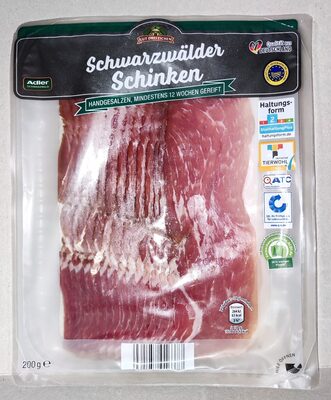
Barcode: 4061458016377
Schwarzwälder Schinken, handgesalzen
HARAM
📝 Reason: The product contains Schweinehinterschinken, which is derived from pork. Pork is explicitly prohibited in Islam as mentioned in the Quran (5:3). Therefore, the entire product is considered Haram. Other ingredients in the product are generally considered Halal, but the presence of pork overrides their status.
📄 Certificates: None
Ingredients:
Details
Understanding the Halal Status of Schwarzwälder Schinken, handgesalzen
Schwarzwälder Schinken, handgesalzen, is a popular type of cured ham from the Black Forest region in Germany. However, for Muslim consumers adhering to Halal dietary laws, the Halal status of this product is a significant concern. In this post, we will explore the ingredients of Schwarzwälder Schinken and establish why it is classified as Haram, as well as discuss the implications for consumers.
The Haram Status Explained
The primary reason Schwarzwälder Schinken is considered Haram relates to its main ingredient, Schweinehinterschinken (ham from the hind leg of a pig). Pigs and their products are explicitly prohibited in Islam, as stated in the Quran (5:3). This makes the entire product non-compliant with Halal standards, regardless of the other ingredients, which might typically be considered Halal.
Ingredient Breakdown
Let’s take a closer look at the ingredients used in Schwarzwälder Schinken:
- Schweinehinterschinken: Derived from pork, this ingredient is the main contributor to the product being Haram. Both the Quran and Hadith emphasize the prohibition of consuming pork.
- jodiertes Speisesalz: (Iodized table salt, potassium iodate) is generally considered Halal unless contaminated with Haram substances. Salt itself does not pose any issues unless mixed with prohibited items.
- Gewürze: (Spices such as coriander, pepper, juniper berries, garlic) are typically Halal unless they have been tainted by Haram elements in processing or packaging. Generally, when sourced properly, spices do not conflict with Halal laws.
- Dextrose: This sugar derived from starch is widely accepted as Halal, as it is predominantly plant-based.
- Natriumnitrit (E250): Sodium nitrite is commonly used as a preservative in meats. It’s considered Halal unless it originates from a Haram source.
- Kaliumnitrat (E252): Potassium nitrate is also a preservative largely recognized as Halal, subject to the same sourcing conditions as sodium nitrite.
- Tannenholzrauch: Smoke flavor from conifer wood is generally accepted as Halal unless it comes into contact with Haram items during the smoking process.
The Implications of Consuming Schwarzwälder Schinken
With the presence of Schweinehinterschinken as a central component, Schwarzwälder Schinken is not suitable for Muslims who practice Halal dietary laws. Understanding this is crucial, especially for those looking for authentic flavors without compromising their religious beliefs. While some ingredients in this product may be Halal, the overriding presence of pork renders it entirely Haram. This serves as a critical reminder for consumers to always check ingredients, especially when dealing with processed products.
Conclusion
To conclude, Schwarzwälder Schinken, handgesalzen, cannot be considered Halal due to the inclusion of pork—an ingredient strictly forbidden in Islam. Even with the other ingredients being generally acceptable, they do not influence the Halal status of the product to render it permissible for consumption. For those seeking Halal alternatives, it may be worth exploring other cured meats that are specifically labeled Halal and certified from reliable producers.

